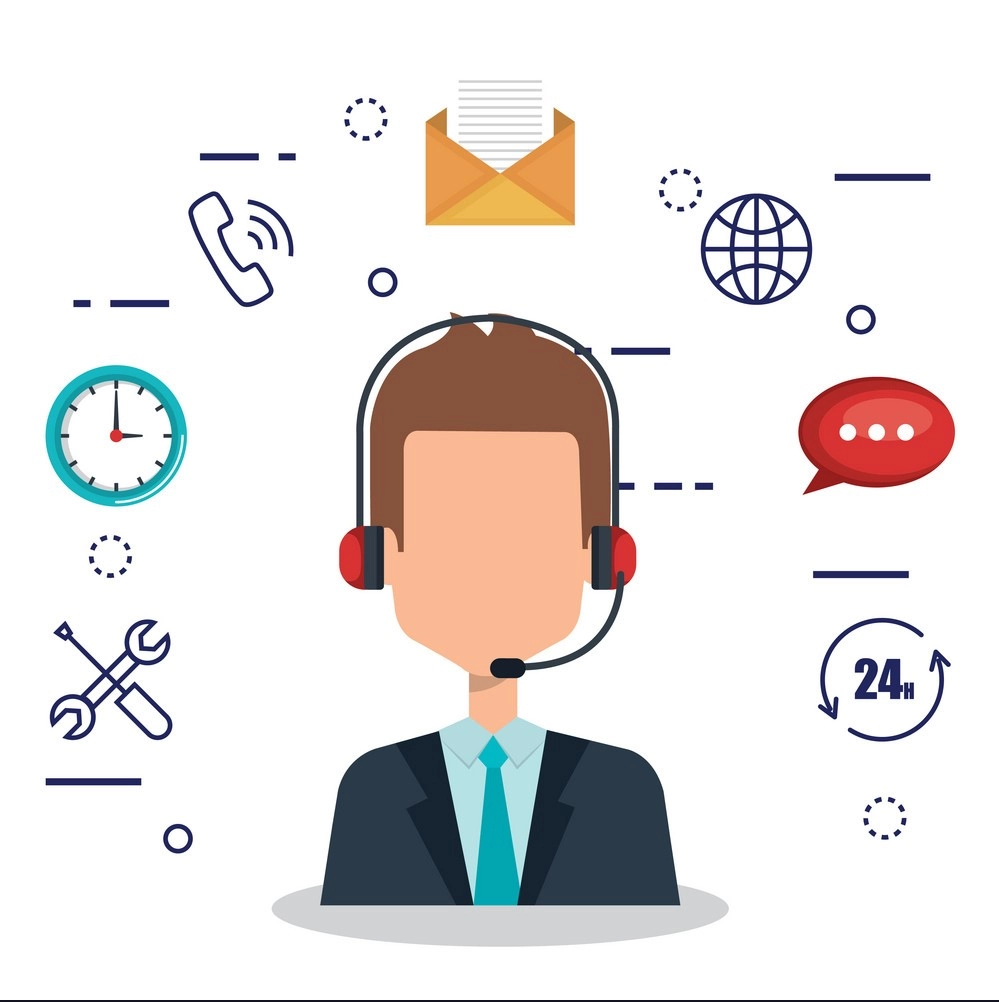What Is a Call Center?
A call center is a functional team within the service department that fields incoming and outgoing customer phone calls. They're operated by representatives who manage each call and keep track of open cases and transactions. To keep their teams organized, team leads use call center software to distribute inquiries and interact with customers all over the world. In customer service, call centers can be proactive (outbound) or reactive (inbound). This means that they can either reach out to customers with service offers, or they can offer traditional support and respond to incoming calls. Many companies now offer proactive customer services to create stronger relationships with customers and capitalize on timely opportunities to upsell and cross-sell. Additionally, call centers can be owned by the parent business or hired as a third-party provider. Depending on the organization's needs, both options provide pros and cons that influence the success of the customer service department. For example, third-party call centers are more efficient, however, they may not be as familiar with the brand's product, service, or reputation. If you're looking for a job in a call center, be sure to clarify whether it's a third-party provider or owned by the parent company. Now that we've covered the fundamentals, let's break down the types of customer service call centers.Types of Call Centers
Work-From-Home
Inbound
Outbound

Work-From-Home Call Centers
Work-from-home, or remote, call centers are quickly being adopted by businesses across the world. These call centers use software that distributes calls to agents who are working in various locations. Instead of all of the agents being positioned in one central office, remote call centers employ reps from all over which creates a more diverse customer service team. The benefit of working in a remote phone service role is that you can work from the comfort of your home. The company will send you all the tools you’ll need to do your job effectively including a headset, a microphone, and even a computer. After that, you can take the company's online courses and training to prepare yourself for future customer interactions. Companies benefit from this setup as it makes it easier for them to provide customer service across multiple time zones. Since the customer service team is working from various locations, businesses with remote call centers can provide coverage during off-hours without having to put employees on different shifts. This makes employee scheduling significantly easier for companies that provide 24/7 customer support.Inbound Call Centers
When customers call into a business for assistance, there’s an inbound customer service representative on the other side of the line waiting to assist them. In this type of role, a rep is skilled in technical support, communication, and problem-solving. Having expertise in each of these areas makes for a better customer experience. In this type of call center, reps must be prepared for anything. Calls that come in could be unfiltered — meaning angry, emotional, or extremely confused customers could dial into your line. The best inbound call reps are patient and assume good intent from every customer.Outbound Call Centers
These types of call centers are responsible for solving customer issues after they’ve made a purchase from your business. You might be wondering, “What’s the benefit in calling a customer to see if they have issues with your products or services? Isn’t that opening a can of worms?” And the truth is, it’s building the customer relationship further. All sorts of things can happen after a customer makes a purchase. They may experience buyers’ remorse which could lead to returns. They might have a simple question about a feature that they haven’t made time to ask about yet. Or, they may have simply called your inbound customer service line and waited on hold too long and never called back. Outbound call centers are oftentimes more pleasant than the inbound call centers, and it’s easy to imagine why. When a friend gave you a call just to check in, say hello, and offer assistance if you need anything, how would you feel? Warm and fuzzy on the inside, I’d bet. The same thing happens with customers when service reps offer proactive assistance. The simple gesture of offering support can build positive customer relationships and turn them into brand loyal advocates. The next time the customer does need assistance, they’ll look forward to calling your outbound line.What do call centers do?
Call centers provide customers with an alternative communication channel to report service inquiries. Rather than writing an email or traveling to a store, customers can simply pick up the phone, tell an agent their problem, and receive a resolution. Many people prefer this type of support over other mediums as it provides immediate service and personalized solutions.
Working In a Call Center
Call centers act as a fundamental component of customer service teams and are often the primary means of communication between a business and it's customers. To work in a call center, you'll need to be motivated by customer success. Call center agents are tenacious problem-solvers who are committed to enhancing customers' experiences with the brand. A call center agent's workday is typically fast-paced and requires them to manage a handful of different responsibilities. Oftentimes, agents need to be flexible with their workflow and capable of handling unexpected roadblocks. While this causes their workday to look different each day, agents will still perform the same core call center duties regardless of the task they're completing.
Call Center Customer Service Duties
Let's review a few of those tasks and responsibilities below.1. Help customers across different customer service platforms.
If you're working in an in-house call center, chances are you'll handle more than just phones. You may be asked to interact with customers via email, live chat, social media, or even in-person. Being able to adapt to the channel you're working on is crucial to providing an omni-channel experience.2. Communicate thoughtful, personalized solutions.
No matter how experienced you are, never assume you know more about the customer's needs than they do. These types of assumptions can lead to miscommunication and frustration for both of you. Instead, the best call center reps are patient and come up with well-thought-out, detailed solutions.3. Create a delightful customer experience.
To stand out from competitors, you need to do more than just provide the right answer. Delightful experiences retain customers which means more revenue for the business. If you're seeking a job in customer service, be sure to highlight your ability to turn a common customer into a loyal advocate.4. Tailor the experience to the customer.
Like snowflakes, no two customers are alike. Each one has their own unique needs and goals that are specific to their situation. Recognizing these differences and adapting your communication to align with each customer is a great way to build rapport.5. Document and respond to tickets efficiently.
When customers have questions, they want answers quickly. That means you need to be organized and capable of thinking on your feet. It also means that you need to be proficient with call center technology. While you'll likely receive training, it may help to familiarize yourself with tools like help desks, knowledge bases, and ticketing systems.6. Report recurring customer roadblocks and significant problems.
Other than solving for the customer, you're also solving for the business. If you notice a pattern of related customer inquiries, you'll need to report those issues to product management. This will help your company identify product flaws and correct them before they create churn.7. Solve for the customer, not your convenience.
This may be your most important duty as a call center rep. It’s tempting to provide a customer with an easy, short-term solution; however, it's important to solve for the customer's long-term needs and not for your own convenience. Customers will recognize the difference and will remain loyal to your business if you truly go above and beyond for them. If you're considering a position in a call center, it helps to understand these fundamental duties and why they're important to a business. No matter which industry the call center belongs to, all of these duties are essential to a customer service team's short and long-term success. By consistently completing these core responsibilities, customer service departments can deliver a positive customer experience on nearly every interaction. To fulfill these duties, call center agents need to work together as a team and create a system that'll manage customer service demands. Customer service managers lead this initiative by strategizing the fielding and distribution of incoming or outgoing calls. Before pursuing a job in a call center, it's important that you understand the details of how a call center works and why this process is effective.How Call Centers Work
A call center works as a communication channel that customers use to report requests or complaints to a business. Customer support and service representatives who work in call centers answer phone calls from customers who need help addressing a specific issue. Reps will then work to solve the customer's problem either during the first interaction or in a follow-up email or call.
1. Customer Makes the Call
The calling process begins when a customer either calls or requests a call from a customer service team. Calls can either be made directly to the call center or through a connected product or app. Some call centers even offer callbacks where the customer signals to the business that they need help, and the call center schedules a time for the agent to call the customer. Once the call is connected to the phone line it may be filtered and transferred by a proactive support service. The filter can be a software or even a live rep that assesses the customer's problem then transfers the call to a designated agent. This comes in handy for call centers who use specialists to address complex or specific issues. Getting calls to the right agent is a smart way for customer service teams to boost case resolution times and improve the customer experience.2. The Rep Works on the Customer's Issue
After the call is transferred to the appropriate representative, the customer service agent will work on resolving the customer's issue. Successful reps possess a blend of experience, product knowledge, and communication skills which helps them fulfill customer needs. Good agents not only know the right questions to ask but also when to ask them, and how to phrase them. Customer service isn't always as simple as just finding out the right answer — and sometimes you need to rephrase solutions a few times to make sure your customer understands or believes it. The goal of the phone call is to resolve the issue during the first interaction. Oftentimes, customer church is preventable if the issue is resolved during the first engagement. This is because first-call resolutions demonstrate that you can provide customers with timely solutions when they need it most.3. The Rep Follows Up
While the agent aims to resolve the problem during the first call, that goal isn't always attainable. Sometimes customer service agents have no choice but to end the call and follow up once they have more information. You may think this risks the potential churn that we discussed earlier, but this step is done for the benefit of both the customer and the representative.Call Center Skills
Knowledge Retention
Flexibility
Attention to Detail
Creativity
Organization
1. Knowledge Retention
Customers don't want to repeat their problems. They're looking for timely solutions and having to re-describe their issue wastes time and doesn't make progress towards a resolution. Good customer service reps interpret customer problems and understand them the first time they hear it.2. Flexibility
One of the most interesting characteristics of customer service roles is that they're day-to-day responsibilities are often unpredictable. Customer roadblocks don't come with any warning and sometimes reps need to be flexible and adapt to unexpected situations. When something important suddenly breaks, the call center agent is one of the first people to provide a response. They need to be constantly ready to spring into action, especially on a moment's notice.3. Attention to Detail
In customer service, providing a customer with nearly the right answer just doesn't cut it. Customers have specific needs and won't overlook small details if they aren't fulfilled. Successful customer service reps pay close attention to customer needs and do everything they can satisfy each one — no matter how small. Doing so demonstrates an above-and-beyond dedication to customer support and will improve customer satisfaction.4. Creativity
Sometimes the solution to a customer's problem isn't clear or achievable. While that may not be the agent's fault, it's still up to them to come up with another solution. This is where call center agents need to be creative and suggest alternative ideas that benefit both the customer and the company. Creative reps use the resources they have at hand to fulfill the customer's needs in an unanticipated way.5. Organization
As mentioned earlier, call center agents take up to 50 calls a day, and not every one is resolved during the first call. Some calls will require a follow-up that may last days or weeks after the first interaction. This challenges reps to manage their open cases efficiently and provide updates in a timely manner. Being well-organized can help you manage ongoing follow-up especially if you don't have access to the appropriate customer service tools. Now that you're familiar with the ins and outs of how a call center operates, you may be eager to start applying for a customer service job. Call center jobs are offered throughout the world, but if you're having trouble finding an opening that's close to you, it may help to consider a remote option.
Working at a Call Center: Pros and Cons
Working in a call center can be very demanding, but also extremely rewarding. Call center agents learn something new almost every day and are constantly being faced with different obstacles and challenges. If you're still on the fence about applying for that call center job, hopefully, these pros and cons can provide that final motivation needed for sending in your resume.Pros of Call Center Jobs
1. You'll gain transferable skills.
A shift is happening. Between advances in technology and 73% of all customers calling to address questions and concerns, companies can see the value of needing the best service for their customers. That means you get the chance to be educated in everything from product training to customer service to program and computer skills. Whether you want to move up in the world of customer service or are a recent graduate looking to gain some entry-level knowledge, the skills developed inside a call center will help you in every job that comes your way. Say you want to branch out into the marketing sphere and exercise your skills in blog writing, market research, or content creation for social. These are all roles and responsibilities you could land with outstanding communication skills and detailed product expertise.2. You'll learn excellent communication skills.
By this, I don't just mean knowing how to talk to someone. I mean the entire spectrum of communication skills. Every customer is looking for a quick, efficient, and pleasant call. Agents need to master the art of communication styles, engaging listening skills, and asking quality questions to get to the root of the problem. According to Paul J. Meyer, "Communication — the human connection — is the key to personal and career success." So, while hitting your goals, you're also becoming a pro at communication in every sense.3. You'll get great compensation and benefits.
For a job that doesn't require a formal degree, call center reps can earn a lot in exchange for the impact they have on a company. How would you feel about generous paid time off, paid holidays, and monthly incentives and bonuses? Between starting salaries of $30K, major perks and promotions, the journey is only upwards for agents. And, many call centers are quick to promote talented employees, whether you've been around for a while or not. Your work speaks for you. So if you're good at what you do, chances are you'll be climbing the career ladder before you know it.Cons of Call Center Jobs
1. There may be unpredictable hours and stress.
Since most companies have global audiences, being in different time zones can sometimes mean you have to be prepared to work nights or weekends. That also means working with different customers from around the globe. But through these experiences, you develop major problem-solving skills and learn how to work independently despite the stress. After a point, you'll be able to provide exceptional customer service, even when you feel the need to recharge. This, ultimately, will prep you for future challenges and leadership positions.2. Your team may experience high turnover.
One of the biggest challenges faced by call centers is increasingly high turnover rates from 17 to 44%. It could be a lack of training or experience or even the many students applying for an entry-level job. You'll be faced with the dynamics of unstable teams, which can lead to difficult change management. However, building trust, growing your teams, and keeping the service consistent within a constantly changing environment also trains you for different work environments and, most importantly, an ever-changing world.3. You may feel stuck in a sedentary position.
Considering the work of an agent is primarily phone-based, most call centers require agents to work eight or nine-hour hour shifts, depending on company policy, state law, and location. Before you know it, you'll be sitting for long periods of time, swiveling around in your chair as you talk to multiple customers throughout the day. Sitting all day can lead to body aches and pains, so don't forget to check your posture, drink water, and take short breaks. A good way to get around this is to invest in a standing desk and a pair of headsets so you can walk around, keep changing positions, get your exercise in and, still, solve for the customer.Answer the Call to Work in a Call Center
As with any job, call centers have their ups and downs. However, prepping with the necessary skills, understanding the responsibilities of the role, and viewing your role as an essential part of the customer experience will ensure you enjoy your role to its fullest.Source: https://blog.hubspot.com/service/working-call-center


